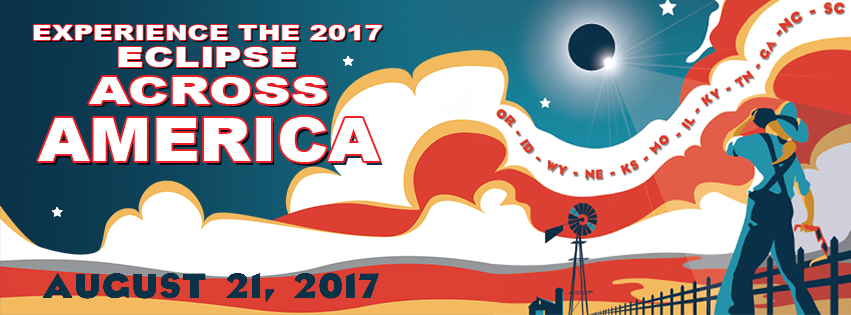Search the Blog
Categories
- Books & Reading
- Broadband Buzz
- Census
- Education & Training
- Friday Reads
- General
- Grants
- Information Resources
- Library Management
- Nebraska Center for the Book
- Nebraska Libraries on the Web
- Nebraska Memories
- Now hiring @ your library
- Preservation
- Pretty Sweet Tech
- Programming
- Public Library Boards of Trustees
- Public Relations
- Talking Book & Braille Service (TBBS)
- Technology
- Uncategorized
- What's Up Doc / Govdocs
- Youth Services
Archives
Subscribe
Tag Archives: 2017 Solar Eclipse Library Programing
Solar Eclipse Resources Part Two: 54 Days and Counting…
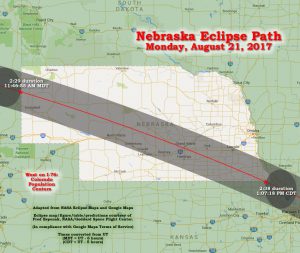 …or 7 weeks, 5 days, 23 hrs, and 14 mins, depending on when you read this of course!
…or 7 weeks, 5 days, 23 hrs, and 14 mins, depending on when you read this of course!
Is your library ready for the celestial event of the century? In 54 days, on August 21, 2017, the shadow of the moon will sweep across the United States from the Pacific Ocean to the Atlantic Ocean in a spectacle that hasn’t occurred in decades. In fact, the last total solar eclipse for the United States was nearly 40 years ago, and the next total eclipse that will be visible in the continental United States will be in 2024. Did you know that Nebraska will be one of the BEST places in the country to view it?
To help your library prepare for this historic event, the Nebraska Library Commission is doing a series of blog posts about resources you can access for your Eclipse programs:
Part 2: Educational Resources
Books & Articles: This section has a great eclipse bibliography for libraries, plus some of the best eclipse related books and articles available for download or purchase: The “All-American” Eclipse: A Guide for Public Libraries and Their Communities, When The Sun Goes Dark: A New, Richly-illustrated Children’s Book on the Science and Fun of Eclipses are just two suggested books available.
Eclipse Videos: In this section, you will find educational videos to educate your library patrons about the 2017 eclipse, courtesy of Exploratorium and Sky & Telescope (each of which has their own great resources). Examples of some of the videos: What is a Solar Eclipse (in English and Spanish), Earth-Sun-Moon Scale Model, and Getting to the 2017 Total Solar Eclipse.
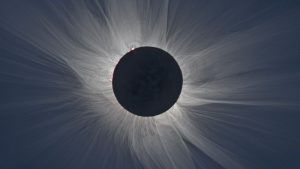 Eclipse Websites: There are a wide variety of really cool websites in this section! NASA, the National Science Teachers Association, the Fiske Planetarium, the Great American Eclipse, and STARnet to name just a few.
Eclipse Websites: There are a wide variety of really cool websites in this section! NASA, the National Science Teachers Association, the Fiske Planetarium, the Great American Eclipse, and STARnet to name just a few.
Have fun checking out all the resources available, and stay tuned next week for Solar Eclipse Resources Part Three!
Solar Eclipse Countdown: 71 Days and Counting…Part 1
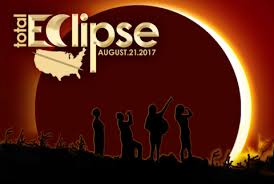 Is your library ready for the celestial event of the century? In 10 weeks, on August 21, 2017, the shadow of the moon will sweep across the United States from the Pacific Ocean to the Atlantic Ocean in a spectacle that hasn’t occurred in decades. In fact, the last total solar eclipse for the United States was nearly 40 years ago, and the next total eclipse that will be visible in the continental United States will be in 2024.
Is your library ready for the celestial event of the century? In 10 weeks, on August 21, 2017, the shadow of the moon will sweep across the United States from the Pacific Ocean to the Atlantic Ocean in a spectacle that hasn’t occurred in decades. In fact, the last total solar eclipse for the United States was nearly 40 years ago, and the next total eclipse that will be visible in the continental United States will be in 2024.
To help your library prepare for this historic event, the Nebraska Library Commission is doing a series of blog posts about resources you can access for your Eclipse programs:
Part 1:
Media Toolkits, where you will find a variety of resources to assist your library in developing educational and promotional materials.
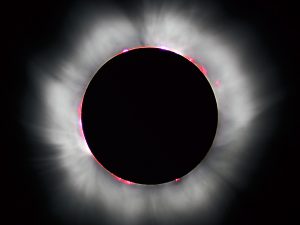
In Images and Videos, you will find lots of pictures for viewing, downloading, and printing out for display. There are also a variety of short clip videos for viewing, downloading, and showing during a program or event.
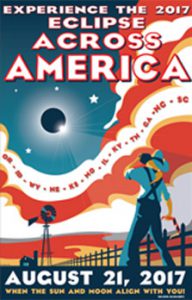 In Downloadables there are posters of various sizes that you can print out for displays.
In Downloadables there are posters of various sizes that you can print out for displays.

And in Media Templates there are Word templates that your library can use to promote your eclipse event to your community: Press Release, Public Service Announcement, Community Letter, and Media Alert.
Just a few things to help get you started with planning library programs for Total Eclipse 2017! Stay tuned for Part 2!
Star Net Eclipse Webinar Series
 Is Your Library Ready for the Astronomical Event of the Decade?
Is Your Library Ready for the Astronomical Event of the Decade?
Star Net is presenting a series of webinars in preparation for the solar eclipse next year.
Next Webinar: Wednesday, October 19th, 2016 at 11:00 am MT, 12:00 CT, 1:00 ET
On August 21, 2017, we will be treated to the first total eclipse of the Sun visible in the continental U.S. in almost 40 years. The spectacular total eclipse will only be visible in a narrow band about 60 miles across, stretching diagonally across the country from a beach in Oregon to a beach in South Carolina. However, everyone in North America will see a partial solar eclipse, where a big “bite” will be taken out of the Sun.
This will be the first major U.S. eclipse of the Internet age, and most people will need clear reliable information on when and how to observe the eclipse of the Sun safely. Astronomers are hoping libraries will play a key role in getting this information out to their communities. Working with astronomy groups in their communities, they could also be a central place for safe observing.
Get an early start in preparing for this eclipse, how to explain it, how to observe it safely, and what role libraries can play in organizing and informing their communities.
Join us for a 45 minute webinar where you’ll get great information about the eclipse, and be able to ask questions about the role your library can play. Hosts: Dennis Schatz (NSTA, Pacific Science Center), and Andrew Fraknoi (Foothill College; co-author of a new book on eclipse education). Click here for an Eclipse FAQ sheet.
To register, please click here. Password is “star”.
Get Your Library Ready for the Total Solar Eclipse — August 21, 2017
 Are you ready for the celestial event of the century? In just over a year from now (August 21, 2017), the shadow of the moon will sweep across the United States from the Pacific Ocean to the Atlantic Ocean in a spectacle that hasn’t occurred in 99 years! The National Center for Interactive Learning (NCIL) at the Space Science Institute has recently been awarded a grant for its NASA@ My Library program. Partners include NASA, ALA, The Girl Scouts, SETI, and many other organizations. The STAR Library Education Network (STAR_Net) is managed by NCIL. The STAR_Net team wants to work with your library and thousands of others to participate in this national event. Some fortunate libraries will be able to experience a total solar eclipse though every library in the country will observe at least a partial eclipse.
Are you ready for the celestial event of the century? In just over a year from now (August 21, 2017), the shadow of the moon will sweep across the United States from the Pacific Ocean to the Atlantic Ocean in a spectacle that hasn’t occurred in 99 years! The National Center for Interactive Learning (NCIL) at the Space Science Institute has recently been awarded a grant for its NASA@ My Library program. Partners include NASA, ALA, The Girl Scouts, SETI, and many other organizations. The STAR Library Education Network (STAR_Net) is managed by NCIL. The STAR_Net team wants to work with your library and thousands of others to participate in this national event. Some fortunate libraries will be able to experience a total solar eclipse though every library in the country will observe at least a partial eclipse.
So jump on the eclipse train!
Go to: Eclipse Registration to register your library.
We will, in turn, let you know how to access the following valuable resources:
· Vetted Multimedia for Programming/Promotion (Images, Video, Animations, Artwork)
· Media Template Package (Press Release, PSA, Community Letter, Media Alert)
· Private Eclipse Forum (registered libraries)
· Inclusion in Special Eclipse Promotions (Social Media, Blogs, Newsletters, etc.)
· Enrollment in STAR_Net’s Eclipse Newsletter
When your eclipse event is planned, you can share your press release, flyer, website link, or like material with us to receive 50 free Solar Shades for your patrons to watch along with us! (shades are available on a first come, first serve basis).
The STAR Library Education Network (STAR_Net) is supported by a grant from the National Science Foundation and other funders. STAR stands for Science-Technology Activities and Resources. This ground-breaking program includes a traveling STEM exhibition program, the development of STEM activities for public libraries, a comprehensive training program that includes in-person workshops and webinars, the development of the STAR_Net Online Community, and a research and evaluation program. STAR_Net is led by the Space Science Institute’s National Center for Interactive Learning. Partners include the American Library Association, Lunar and Planetary Institute, and the Afterschool Alliance along with many other organizations.
Posted in Books & Reading, Education & Training, General, Information Resources, Library Management, Programming, Uncategorized, What's Up Doc / Govdocs
Tagged 2017 Solar Eclipse Library Programing, free, Library Programing, Nebraska, public Library, Solar Eclipse, Total Eclipse 2017
Leave a comment
